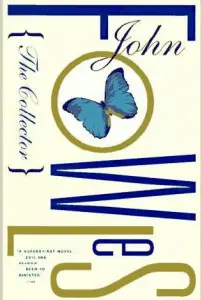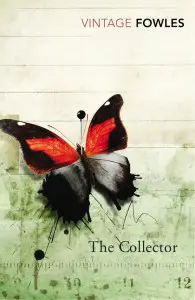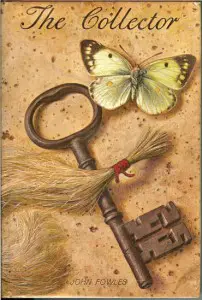 “We all want things we can’t have.”
“We all want things we can’t have.”
(John Fowles, The Collector)
John Fowles is a well-known British author (1926 – 2005) who has dedicated his life to the world of literature. His first novel, The Collector, published in 1963, has been reprinted several times and has been translated into many languages, thus proving that Fowles’s early works are still of interest to the public.
Readers at large better know John Fowles for two of his most acclaimed novels. The Magus, published in 1965, has generated the most lasting interest, becoming something of a cult novel, particularly in the United States of America. The most commercially successful, The French Lieutenant’s Woman, appeared in 1969 and won several awards and was made into a well-received film (1981) starring Meryl Streep in the title role.
A recurring theme in all the three novels mentioned above is Fowles’s vision of the world as having a double reality. The Magus puzzles us with its world of dreams and realities on a Greek island, while Sarah Woodruff from The French Lieutenant’s Woman creates her own world, wills herself to be an outsider, a “femme fatale”, apart from convention and history. The Collector presents the struggle of a girl who has built her own reality through memories in order to survive forced seclusion.
After winning the lottery, Ferdinand Clegg, a lonely entomologist, buys a big house in the countryside and kidnaps Miranda Grey, a beautiful twenty-one years old art student with whom he has been obsessed for some time. After a long period of preparations and observations, he forcefully brings Miranda to his own cellar, especially modified to house her for a long time. He treats her nicely, buying all she desires in terms of food, clothes, books, music, and art. He fulfills her every need except her want to be free. He holds her captive, without any connection to the outside world, in the hope that she will eventually grow to know and love him.
The book can be read as a thriller viewed, in turn, from the point of view of the two characters. The first part presents the collector’s view of the story. We find out that the title character, Frederick, or Ferdinand, as he prefers to be called, had a very unhappy and lonely childhood. His father dies in a car-crash when he is just two years old. After that, his mother goes off with another man. For the rest of his youth, his Aunt Annie and his Uncle Dick bring him up in the lower class suburbs of London, along with his two cousins. One of them, Mabel, whom Ferdinand dislikes taking care of, is a spastic girl who needs assistance while walking. His other cousin goes to Australia and never sees him again, but as soon as Uncle Dick dies, he moves out and starts collecting butterflies.
His decision to collect not only butterflies, but also the long admired object of his fantasy, Miranda, is made possible by the fact that he wins a large amount of money. As a prisoner in a secluded basement, Miranda is cared for very well, and thus at first the reader has the feeling that Ferdinand is not a monster, but a pitiful, lonely man in need of love. Ferdinand thinks that money is enough to make Miranda love him. But he is wrong.
 However, The Collector is more than just a thriller. The author’s way of narrating the story gives the reader deep insights into the minds of the two characters. On a psychological level, the book presents Fowles’s mastery in conveying profound meanings to the words he uses. If we analyze the collector’s actions and thoughts, we realize that he has a psychotic mind. Before kidnapping Miranda, while he was thoroughly preparing the details of his future actions, he tries to convince himself that he is not mad, that all his dreams and the imaginary stories he makes up in his mind about Miranda being his wife, are something normal, as long as there is “nothing nasty” in them.
However, The Collector is more than just a thriller. The author’s way of narrating the story gives the reader deep insights into the minds of the two characters. On a psychological level, the book presents Fowles’s mastery in conveying profound meanings to the words he uses. If we analyze the collector’s actions and thoughts, we realize that he has a psychotic mind. Before kidnapping Miranda, while he was thoroughly preparing the details of his future actions, he tries to convince himself that he is not mad, that all his dreams and the imaginary stories he makes up in his mind about Miranda being his wife, are something normal, as long as there is “nothing nasty” in them.
Frederick is unable to adapt to the modern, the real world. He lives in a world of dreams and fantasies, unconsciously influenced by popular TV shows and movies. He believes that he can build a parallel world for himself and Miranda, where they can live happily together as husband and wife. As long as he thinks that he can make her fall in love with him, it doesn’t matter that Miranda is a prisoner living in a room in his secluded basement.
What makes Ferdinand a dangerous character with a stubborn personality is the fact that he believes he is always right. He believes that he is doing the best thing for both Miranda and himself. He is even proud of the way he manages to kidnap the girl without leaving any trace. Before winning the pools, he saw the world through the eyes of a man who was bullied and rejected by society. Now that he is rich, he can build his own world, a world seen through the eyes of a collector. He even divides people into specimens that are or aren’t worth collecting.
He treats Miranda with a divine vision in mind. She is the rarest thing that a collector can ever get. She is the pride of his collection. But he cannot understand that, in order to collect, he also has to take life. This is exactly what he does with Miranda. At first he takes away her life as a member of society and, later on, he literally lets her die. He acts like a psychopath who can only feel alive when he has in his possession the only thing that’s missing from his collection: Miranda.
Fowles makes the interesting choice of using quotation marks around Miranda’s dialogue, but not Frederick’s. Perhaps this is meant to signify that he lives so much in his dreamworld inside his head that his thoughts are inseparable from his speech.
The latter part of the book presents Miranda’s thoughts through the medium of her diary, kept secret during her captivity. We are thus allowed into the mind of a captured woman who, desperate in her solitude, comes to realize her need for the company of her own captor. Through a series of flashbacks, that bring the reader into Miranda’s past, we find out about her parents, her friends and her mentor, the painter G.P. As she goes deeper into the history of her past, the Fowles’s skill at characterization comes to light, possibly making Miranda one of his greatest female characters.
After she recovers from the shock of being kidnapped, she makes a deal with Ferdinand: he would release her after four weeks. During that time they talk a lot, look at art books, and she even does some painting. At the beginning she is not allowed to see daylight, a fact that affects and changes her a lot. Her struggle to see a last ray of sun even on her death bed stands proof of how much she suffered in the dark room, illuminated only by artificial light.
 Miranda’s will to survive impresses the reader. During the time she is locked up, she tries several times to escape. One morning, when he opens the cellar door, she pushes so hard against it that he gets stuck between the wall and the door. Another time, when she is allowed to write a letter, she tries to put a tiny piece of paper with her location in the envelope. Later, when Ferdinand is away shopping, she tries to dig a tunnel by getting stones out of the wall. As a last resort, she tries to seduce him, but all her attempts fail. When she realizes that Ferdinand won’t let her leave, not even after one month, she thinks of killing him.
Miranda’s will to survive impresses the reader. During the time she is locked up, she tries several times to escape. One morning, when he opens the cellar door, she pushes so hard against it that he gets stuck between the wall and the door. Another time, when she is allowed to write a letter, she tries to put a tiny piece of paper with her location in the envelope. Later, when Ferdinand is away shopping, she tries to dig a tunnel by getting stones out of the wall. As a last resort, she tries to seduce him, but all her attempts fail. When she realizes that Ferdinand won’t let her leave, not even after one month, she thinks of killing him.
Fowles’s psychological study of the two characters is, in fact, a battle of minds and wills. During her time in captivity Miranda didn’t lose her desire to live. She is a survivor. She tries to remain sane by writing about those she loves. An important factor in her survival is the fact that she finds freedom in art. Her moments of solitude are spent in the world of art, a world dominated by the influence of her mentor. Miranda travels down the path of self-spiritual discovery, while she spends her time thinking about life and art. As David Loftus, a Resident John Fowles Scholar puts it, “the narrative encourages us to meditate on the differences between the privileged and elite (not only in terms of class and economics, but native talent and ability) and the masses, and what each may owe or offer to the other.”
The reader condemns the collector’s actions and perceives him as evil and immoral. But the motive, his upbringing, his strong sense of values and his undying adoration of Miranda makes the reader sympathize with Frederick, too. Near the end, when the unexpected tragedy occurs, we realize the true terror of the situation and what Frederick is really made of.
Another important aspect that could be discussed is the role of class and social status in the novel. The Collector portrays the stark class differences that exist in British society during the 1960s. Miranda is from an upper-class background and has a privileged upbringing, while Clegg is from a working-class background and is socially marginalized. The novel explores how these class differences affect their relationship and the power dynamics between them.
Another interesting topic that could be explored is the psychological and philosophical themes in the novel. The Collector delves into the nature of obsession, control, and the human desire for power. The novel raises important questions about the nature of freedom and agency, and the consequences of attempting to control and possess another human being.
Furthermore, the article could also examine the literary techniques used by Fowles in The Collector. The novel is known for its unique narrative structure, which alternates between the perspectives of Clegg and Miranda. Fowles also employs various literary devices such as symbolism, foreshadowing, and irony to enhance the themes and plot of the novel.
In conclusion, The Collector is a complex and thought-provoking novel that addresses a range of important themes and issues. By exploring the role of class, the psychological and philosophical themes, and the literary techniques used by Fowles, readers can gain a deeper understanding and appreciation of this timeless classic.
In The Collector, John Fowles presents a gripping, well-written story that not only horrified me but also made me think of my own life and passions. In a way, all of us are collectors. We all have something that is dear to our heart. Either it is stamps, books, coins, paintings or butterflies, we all tend to keep for ourselves the things that attract us most. When such passions are transformed into obsessions, the human mind builds a new reality that will suit the actions that one undertakes in order to fulfill his or her dreams. It is this kind of thrilling reality that The Collector offers us.


Very well percieved Analysis. Thank you.
before reading the book this became a good basis for me in order to begin. At the begining I read 2 pages and tried to understand but later decidde to have look at the analyse of it. then I found this advantageful in the shape of essay artical. thanks for your info…
All the way up until she died i still sympathized with Ferdinand, I had much pity for him and little for Miranda. I suppose I developed the bias from his perspective in the beginning of the novel, and it just stuck with me. A very good read.
My real world is book’s reality. I think that is the reason I feel the collector dimension insanely and suffer deeply through all pages, because I do not have my own world, but I live on those made of paper and words. I cried while reading the book. I see myself as Frederick and as Miranda, to be honest I fell in love for Miranda and now I cannot sleep in peace. They existed, no. They are just characters from a book. Miranda could not die, she did not exist, which is worse? I must find out a new book to live, a new universe to be , cause if I keep living their book, I will no longer breath. I do not even know why I am writing, nobody hear my voice, I imagine it is a way to stay sane. I am writing to myself. Do I exist or am I in their book?